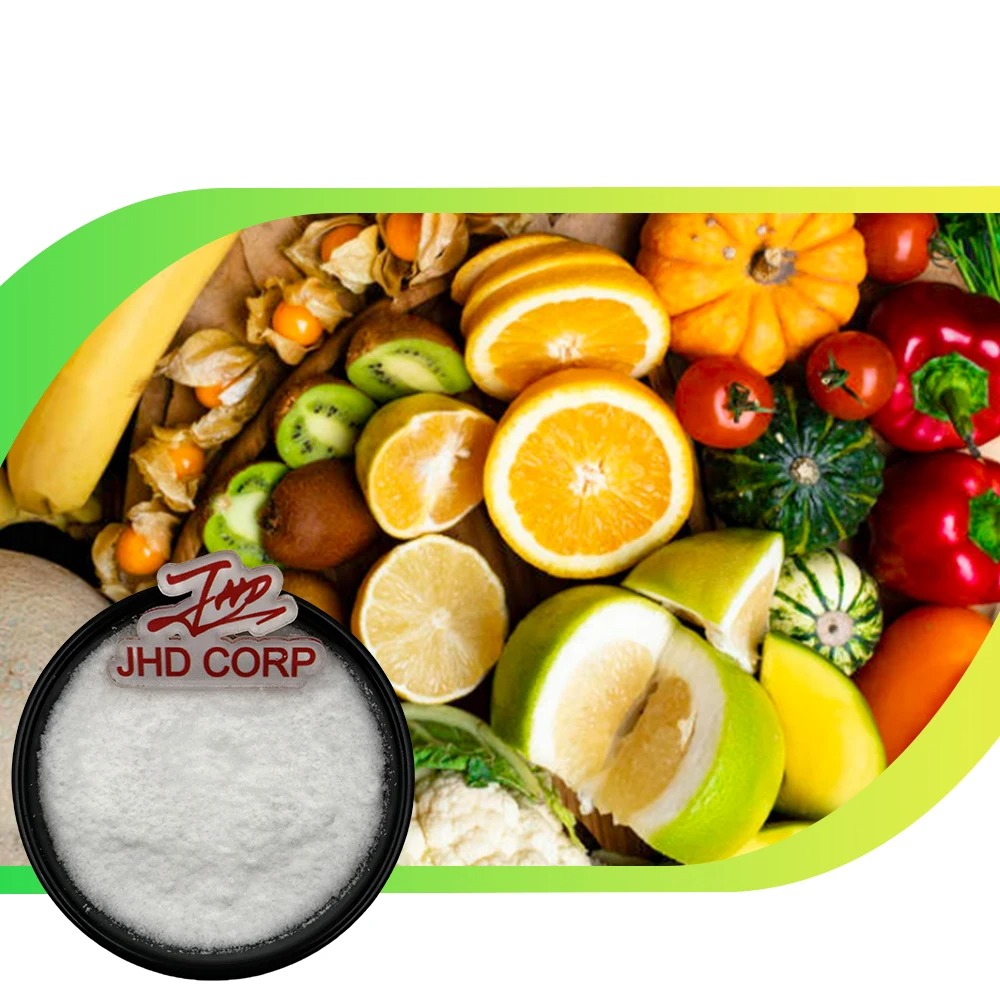Welcome to JHD Nutrasource!
Shop
Ascorbic Acid Vitamin C Powder
Ascorbic Acid Vitamin C Powder, a cornerstone in the realm of essential nutrients, presents itself as a white to slightly yellow crystalline powder. It carries a distinct sour taste, a characteristic stemming from its acidic nature. This water-soluble vitamin is highly soluble in water, readily dispersing to form clear solutions, while showing only slight solubility in ethanol. Chemically, it is a six-carbon lactone derivative, boasting a unique molecular structure that endows it with strong reducing properties. These properties are crucial for its role as a powerful antioxidant within the body. Ascorbic acid is not only a vital nutrient for human health but also finds extensive applications in various industries due to its versatile chemical and physical properties.
| Product Name | Ascorbic Acid Vitamin C Powder |
| Appearance | White Powder |
| Specification | 98% |
| Test Method | HPLC |
| CAS No | 50-81-7 |
| MF | C6H8O6 |
| Certificate | ISO/cGMP/KOSHER/HALAL/USDA ORGANIC |
Description
Functions
Antioxidant Defense: Ascorbic acid acts as a potent antioxidant, tirelessly neutralizing free radicals that can cause oxidative stress. Free radicals are unstable molecules that can damage cells, proteins, and DNA, contributing to aging and various diseases. By scavenging these harmful molecules, vitamin C protects cells from oxidative damage, helping to maintain overall cellular health.
Collagen Synthesis: It serves as an essential cofactor for the synthesis of collagen, a fibrous protein that provides structure and support to skin, bones, tendons, ligaments, and blood vessels. Adequate vitamin C intake ensures proper collagen formation, which is vital for maintaining healthy skin, promoting wound healing, and supporting the integrity of connective tissues.
Immune System Enhancement: Vitamin C plays a multifaceted role in enhancing immune function. It promotes the activity of white blood cells, such as lymphocytes and phagocytes, which are responsible for identifying and destroying pathogens. Additionally, it aids in the production of antibodies, which are crucial for the body’s defense against infections.
Iron Absorption:Ascorbic acid significantly aids in the absorption of non-heme iron, the form of iron found in plant-based foods. By reducing ferric iron (Fe3+) to ferrous iron (Fe2+), it makes iron more soluble and easier to absorb in the small intestine. This is particularly important for individuals following vegetarian or vegan diets, as well as those at risk of iron deficiency.
Neurotransmitter Synthesis: It participates in the synthesis of neurotransmitters, such as serotonin, dopamine, and norepinephrine, which are essential for proper brain function and mood regulation. Adequate vitamin C levels are necessary for the production of these neurotransmitters, helping to maintain mental health and emotional well-being.
Applications
Food & Beverage Industry: In the food and beverage sector, ascorbic acid is widely used as a fortifier to enhance the nutritional value of products. It is added to juices, sports drinks, and processed foods to provide a boost of vitamin C. Additionally, it functions as an antioxidant and preservative, preventing oxidation and spoilage of food products, thereby extending their shelf life. For example, it is commonly used in fruit juices to prevent browning and maintain the freshness of the product.
Pharmaceutical Industry:In pharmaceuticals, ascorbic acid is formulated into various dosage forms, including tablets, capsules, syrups, and injectables. It is used to treat vitamin C deficiency, also known as scurvy, a condition characterized by fatigue, weakness, gum disease, and skin problems. Moreover, it is included in multivitamin supplements and immune-boosting formulations to support overall health and prevent infections.
Cosmetics Industry:In cosmetics, ascorbic acid is a popular ingredient in skincare products due to its anti-aging and skin-brightening properties. It stimulates collagen production, reducing the appearance of fine lines and wrinkles, and improves skin texture and elasticity. Additionally, it helps to fade dark spots and hyperpigmentation, giving the skin a more even and radiant complexion. It is commonly found in serums, creams, and masks.
Animal Nutrition: Ascorbic acid is also an important nutrient in animal nutrition. It is added to animal feed to support the growth, development, and immune function of livestock and pets. In aquatic animals, it helps to improve stress tolerance and disease resistance, ensuring healthy growth and productivity.

